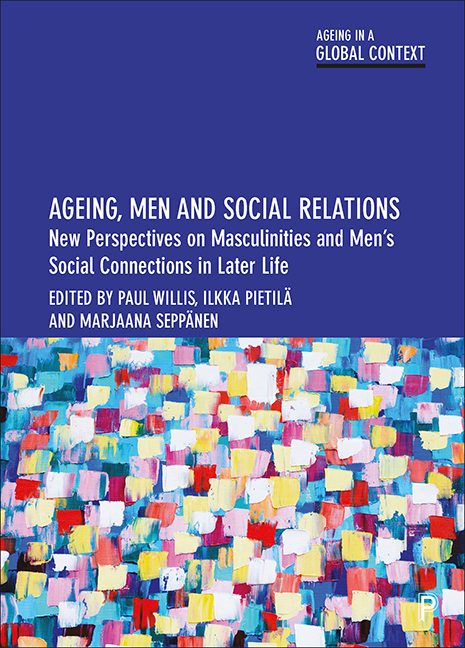 Ageing, Men and Social Relations
Ageing, Men and Social Relations Published online by Cambridge University Press: 18 January 2024
Introduction
Loneliness has been widely considered a major problem for older people and ageing societies. At the same time, it has become a popular topic for gerontological research across disciplines. However, research examining loneliness from life course or life historical perspectives have been scarce. Little is known of older men’s lived experiences related to long-term loneliness and the life pathways and events preceding them. By examining the cases of two older men, this chapter aims at providing new perspectives to not only later life loneliness but also to the complex social bonds of older men.
While definitions and theories on loneliness vary, loneliness is widely understood as a subjective and emotional experience referring to absence of meaningful social relations or unfulfilled desires towards existing ones (see, for example, Victor et al, 2009; Tiilikainen and Seppänen, 2017; Jansson, 2020; Morgan and Burholt, 2020). At its simplest, loneliness can be described as an emotional state portraying an individual’s perceived belongingness to others. In addition – or despite of – its subjective nature, loneliness is strongly shaped by the surrounding social world, as well as the lives of others. Importantly, many loneliness theories have aimed at describing the complexity and multidimensionality of loneliness (for example, Perlman and Peplau, 1998). Although many people experience loneliness as a relatively similar, unpleasant and even painful experience, its meanings, causes and consequences are highly diverse (for example, Victor et al, 2009; Tiilikainen, 2019).
An often-used conceptualisation of loneliness is the distinction between emotional and social loneliness, which was first introduced by psychologist Robert Weiss (1973) in his qualitative case studies. According to Weiss, emotional loneliness is caused by the loss or absence of a close attachment, such as a partner, parent or child. Social loneliness, in turn, is connected to the lack of social contacts and social interaction and therefore experienced within broader networks. Weiss describes emotional loneliness as an experience that is similar to the sadness and distress of a young child who has been abandoned by his parents, while social loneliness includes feelings of boredom and exclusion, emotions that a child may experience when friends are gone.
To save this book to your Kindle, first ensure no-reply@cambridge.org is added to your Approved Personal Document E-mail List under your Personal Document Settings on the Manage Your Content and Devices page of your Amazon account. Then enter the ‘name’ part of your Kindle email address below. Find out more about saving to your Kindle.
Note you can select to save to either the @free.kindle.com or @kindle.com variations. ‘@free.kindle.com’ emails are free but can only be saved to your device when it is connected to wi-fi. ‘@kindle.com’ emails can be delivered even when you are not connected to wi-fi, but note that service fees apply.
Find out more about the Kindle Personal Document Service.
To save content items to your account, please confirm that you agree to abide by our usage policies. If this is the first time you use this feature, you will be asked to authorise Cambridge Core to connect with your account. Find out more about saving content to Dropbox.
To save content items to your account, please confirm that you agree to abide by our usage policies. If this is the first time you use this feature, you will be asked to authorise Cambridge Core to connect with your account. Find out more about saving content to Google Drive.